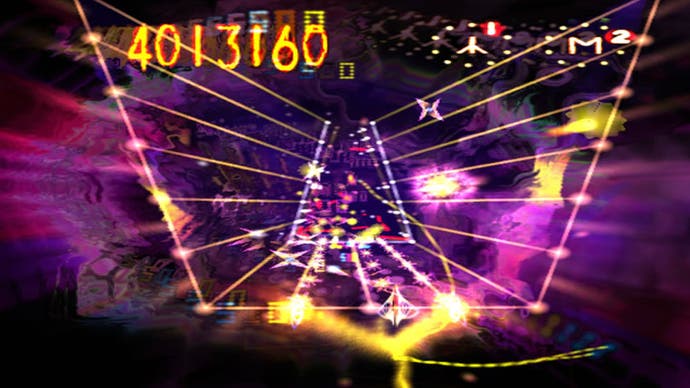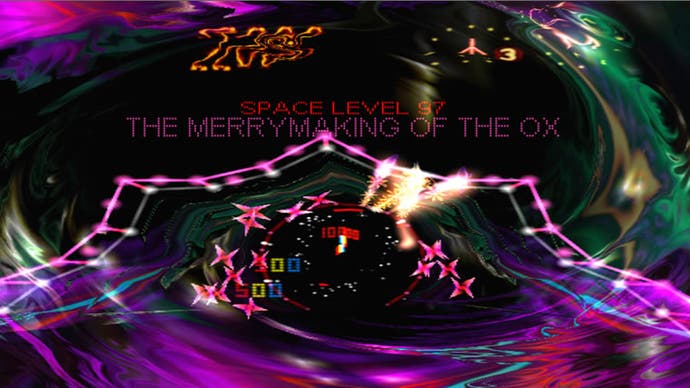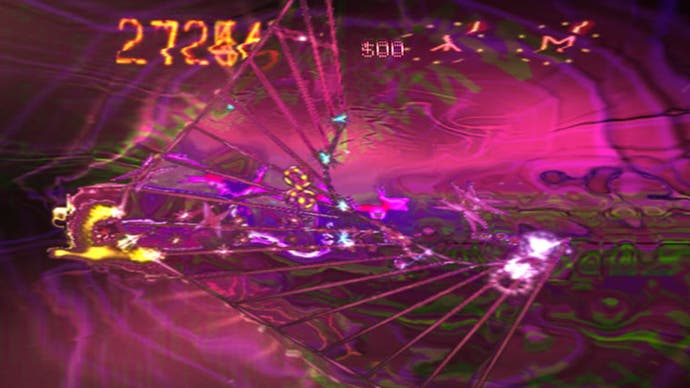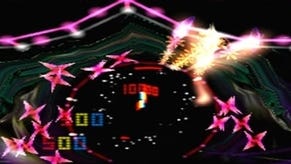Space Giraffe
Splodgenessabounds.
Rob Fahey's take
Life is scattered with those little coming-of-age moments; instants in your life when you realise you've been sitting on a fence all this time, and you must now decide on which side your feet belong.
For example - about three weeks ago, I encountered a jar of Marmite in the kitchen cupboard. It struck me, as I turned it over in my hand, that I've probably described games, films, books and their ilk as being "a bit like Marmite" countless times - and yet I've never actually worked out on which side of the famous Marmite Divide I fall.
So I made some toast. And I cautiously spread a thin slick of Marmite on it, just enough to brown the surface; sniffed experimentally, raised it to my mouth, and bit off a chunk.
Then I gagged, my eyes watered, I thought I was going to throw up, and I chucked the rest of the toast in the bloody bin while I gulped down about two pints of water. What the bloody hell is wrong with you sick weirdos?
Interstellar Okapi

The anecdote is relevant (honest), because where Space Giraffe is concerned, I feel like the shoe is on the other foot. My gut reaction is to recommend that everyone should play it - but somewhere at the back of my mind, I know that the majority of you will probably gag, choke, and throw it in the bin. Probably followed by glowering at me about wasted Microsoft Points (much as my Marmite-munching flatmate did after I encouraged him to buy the game).
Kristan has already described perfectly the basics of how the game works. Despite Jeff Minter's claims to the contrary, it is very clearly an evolution of the Tempest formula - but one which takes the same basic controls and mechanics and fashions a radically overhauled experience from them.
The addition of enemies such as Flowers (which essentially block your ability to move around the game surface freely for a period of time) and Boffins (nasty little sods that can only be shot when they're moving horizontally) turns the game into a vastly more strategic affair than Tempest ever was. Indeed, of all of Minter's games to date, it's arguably the one which demands the most from its players, forcing you to keep an eye on a wide range of different factors rather than simply shooting lots and dodging bullets.
There's a sense that you're not just fighting enemies here; you're actively nurturing a play area, attempting to set up the conditions for the best score possible. Simply shooting everything is a tactic that stops working early in the game; as you progress, you're expected to take a holistic approach that "gardens" the playing grid until the time is right to bull a large number of enemies off at once.
That, for me at least, is what makes Space Giraffe extraordinary. I'll admit it up front - I don't have the reactions required for twitch shooters any more, much as I love the genre, but Space Giraffe actually offers something vastly more strategic and cerebral than most other shooters. It's hidden away under a thick layer of eye-blasting visuals, silly humour and fast-paced action, but it's there and it's utterly compelling.
Galactic Zebra

Ah, yes - the eye-blasting visuals. A common and perfectly understandable complaint about Space Giraffe is that you can't see what's going on due to Minter's inclusion of light synth backdrops, which plaster your screen with bright plasma effects that do frequently obscure important gameplay elements like enemy bullets or flower stems.
It's a legitimate complaint - but once again, I find myself remembering standing over my kitchen sink gagging on the taste of a condiment my flatmate can happily munch down by the teaspoonful. To me, the light-synth backdrops are a major part of the appeal of Space Giraffe; a kind of trippy, ecstatic visual that plays with your perception and draws you deeply into the experience of the game.
It's not like the backdrops just sit there and look pretty, either. They are a core element of the game to a large extent, and deliberately or not, Space Giraffe is a remarkably successful experiment on human perception. The light synth confuses our visual input, in effect; it makes visual feedback useful only in a general sense, obscuring the fine but vital details like bullets.
Instead, you're forced to rely on auditory feedback for those game systems - the unique audio cues which Space Giraffe uses for every event in the game. Shooting bullets and flowers, and listening for the resulting sounds, builds up a map of what's happening, even when a flare from the light-synth is obscuring reliable visual information. For some players, this will be incredibly frustrating; for others, however, the moment when this mechanism clicks in your head is an eye-opener, a revelatory unveiling of a whole new level to the game.
The wheat really gets separated from the chaff with the introduction of Feedback Monsters - a type of enemy which, as far as I can recall, is almost entirely unique to Space Giraffe. These enemies don't actually harm you, can be safely bulled off the edge of the screen, and are generally non-threatening - except that they generate intense visual distortions which screw with your perception even more than the light synth does. A player who is working efficiently with sound at this point won't find them too challenging; someone still getting by on the tangled visual information will be crippled.
Solar Antelope

Therein lies the beauty of Space Giraffe, for the minority of players who will really "get" the game - it forces you to deal with input in ways which are unfamiliar and difficult, to develop faculties which have never been called upon by other games. Its uniquely British humour and gentle progression system (the ability to restart levels with saved high-score is a hugely welcome feature) provide light relief to what is, essentially, one of the most unorthodox and alien gaming experiences you'll ever have.
If you're in the majority of gamers who don't get Space Giraffe, that's by no means an indication that you're a lesser gamer than someone who does get it. Your brain just isn't tuned to this unusual frequency; hell, if you don't get it, it probably just means you're normal. We're the freaks. But some days it's good to be a freak - and as a sufferer from this freakish affliction, I can't help but rate Space Giraffe highly.









